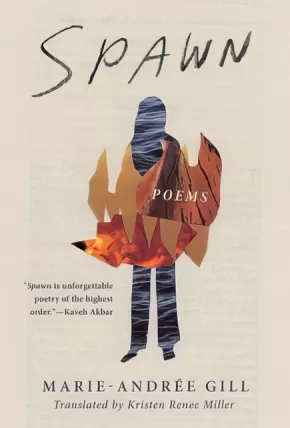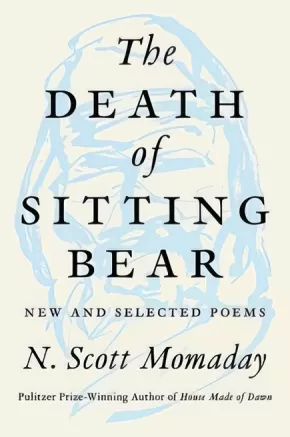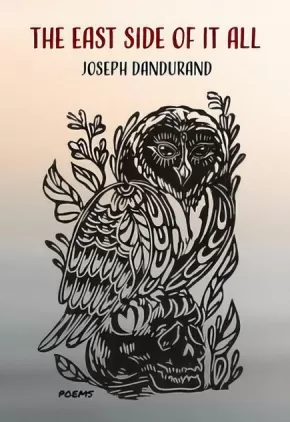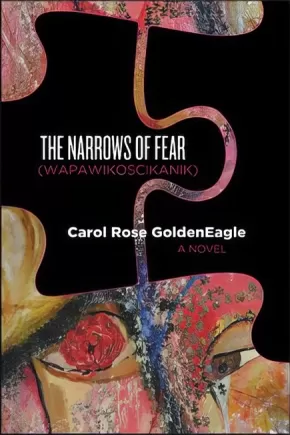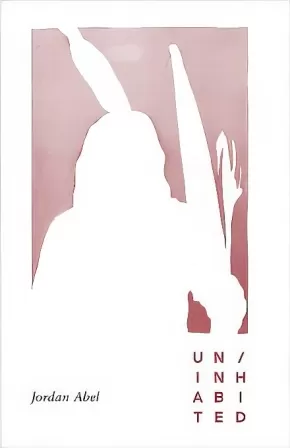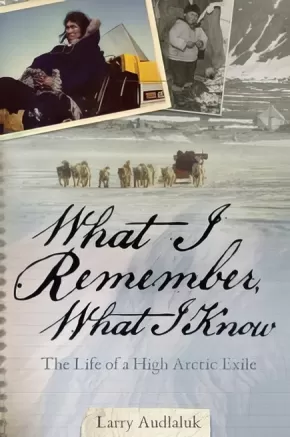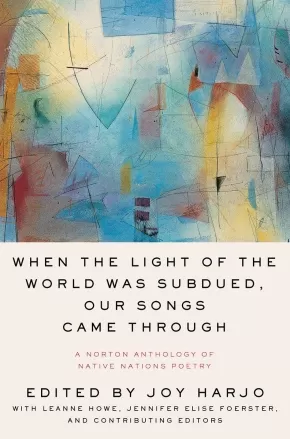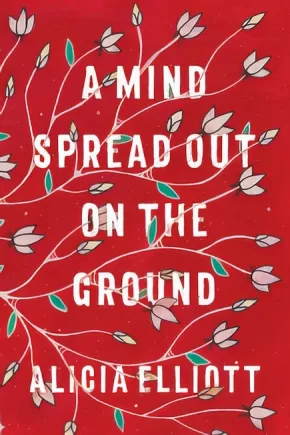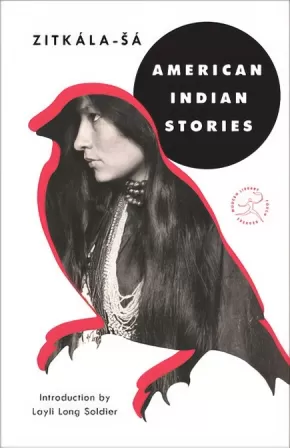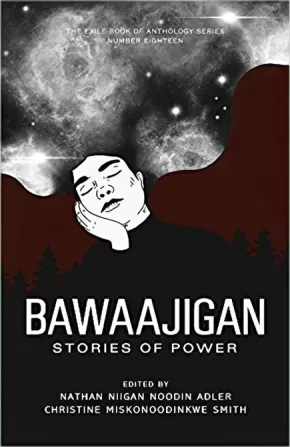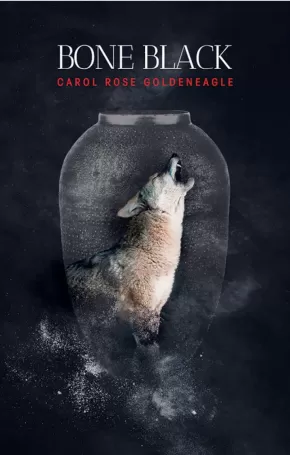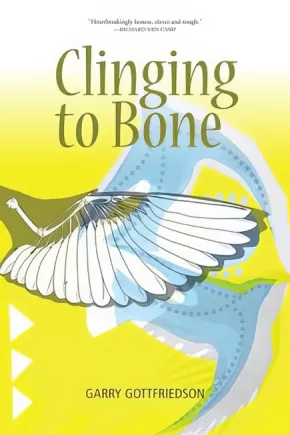Literary Studies
Synopsis:
Spawn is a braided collection of brief, untitled poems, a coming-of-age lyric set in the Mashteuiatsh Reserve on the shores of Lake Piekuakami (Saint-Jean) in Quebec. Undeniably political, Marie-Andrée Gill's poems ask: How can one reclaim a narrative that has been confiscated and distorted by colonizers?
The poet's young avatar reaches new levels on Nintendo, stays up too late online, wakes to her period on class photo day, and carves her lovers' names into every surface imaginable. Encompassing twenty-first-century imperialism, coercive assimilation, and 90s-kid culture, the collection is threaded with the speaker's desires, her searching: for fresh water to "take the edge off," for a "habitable word," for sex. For her "true north"—her voice and her identity.
Like the life cycle of the ouananiche that frames this collection, the speaker's journey is cyclical; immersed in teenage moments of confusion and life on the reserve, she retraces her scars to let in what light she can, and perhaps in the end discover what to "make of herself".
Reviews
"Spawn is an epic journey that follows the ouananiche in their steadfast ability to hold: rigid, shimmering, hardened to the frigid waters of winter, in all of its capacities of and for whiteness. Here, poems summon a spawn of wonderworking dreams: 'a woman risen up from all these winter worlds, heaped with ice [and] ready to start again'." —Joshua Whitehead, author of Jonny Appleseed
"Spawn is unforgettable poetry of the highest order." —Kaveh Akbar, author of Calling a Wolf a Wolf
"Gill's poems are like small treasures clutched in buried tree roots, preserving 'the chalky veins' of ancestral memory pulsing just below our modern hustle." —Kiki Petrosino, author of White Blood
Educator Information
Recommended in the Canadian Indigenous Books for Schools 2020/2021 resource list for grade 12 for English Language Arts and Social Justice.
Caution: Some foul language, sexual and violent content.
Additional Information
96 pages | 5.25" x 7.75" | Translated by Kristen Renee Miller
Synopsis:
A remarkable and profound collection of reflections by one of North America’s most important Indigenous leaders.
My name is Wa’xaid, given to me by my people. ‘Wa’ is ‘the river’, ‘Xaid’ is ‘good’ – good river. Sometimes the river is not good. I am a Xenaksiala, I am from the Killer Whale Clan. I would like to walk with you in Xenaksiala lands. Where I will take you is the place of my birth. They call it the Kitlope. It is called Xesdu’wäxw (Huschduwaschdu) for ‘blue, milky, glacial water’. Our destination is what I would like to talk about, and a boat – I call it my magic canoe. It is a magical canoe because there is room for everyone who wants to come into it to paddle together. The currents against it are very strong but I believe we can reach that destination and this is the reason for our survival. —Cecil Paul
Who better to tell the narrative of our times about the restoration of land and culture than Wa’xaid (the good river), or Cecil Paul, a Xenaksiala elder who pursued both in his ancestral home, the Kitlope — now the largest protected unlogged temperate rainforest left on the planet. Paul’s cultural teachings are more relevant today than ever in the face of environmental threats, climate change and social unrest, while his personal stories of loss from residential schools, industrialization and theft of cultural property (the world-renowned Gps’golox pole) put a human face to the survivors of this particular brand of genocide.
Told in Cecil Paul’s singular, vernacular voice, Stories from the Magic Canoe spans a lifetime of experience, suffering and survival. This beautifully produced volume is in Cecil’s own words, as told to Briony Penn and other friends, and has been meticulously transcribed. Along with Penn’s biography of Cecil Paul, Following the Good River, Stories from the Magic Canoe provides a valuable documented history of a generation that continues to deal with the impacts of brutal colonization and environmental change at the hands of politicians, industrialists and those who willingly ignore the power of ancestral lands and traditional knowledge.
Reviews
“The Magic Canoe brings peace to one’s soul. It is a warm wind moving our hearts. Wa’xaid takes us on a journey that regenerates and empowers us. T’ismista, the stone hunter, looks down on the Magic Canoe and reminds us to listen to storytellers like Cecil Paul. This is a story for the family of man; we are all in the canoe together and our stories need to be shared with each other.” – Roy Henry Vickers
Educator Information
Recommended in the Canadian Indigenous Books for Schools 2019-2020 resource list, as well as the 2020-2021 resource list, for grades 9 to 12 for English Language Arts, Social Studies, and Science.
Additional Information
224 pages | 5.00" x 7.00" | Paperback
Synopsis:
Pulitzer Prize winner and celebrated American master N. Scott Momaday returns with a radiant collection of more than 200 new and selected poems rooted in Native American tradition.
“The poems in this book reflect my deep respect for and appreciation of words. . . . I believe that poetry is the highest form of verbal expression. Although I have written in other forms, I find that poems are what I want and need most to read and write. They give life to my mind.”
One of the most important and unique voices in American letters, distinguished poet, novelist, artist, teacher, and storyteller N. Scott Momaday was born into the Kiowa tribe and grew up on Indian reservations in the Southwest. The customs and traditions that influenced his upbringing—most notably the Native American oral tradition—are the centerpiece of his work.
This luminous collection demonstrates Momaday’s mastery and love of language and the matters closest to his heart. To Momaday, words are sacred; language is power. Spanning nearly fifty years, the poems gathered here illuminate the human condition, Momaday’s connection to his Kiowa roots, and his spiritual relationship to the American landscape.
The title poem, “The Death of Sitting Bear” is a celebration of heritage and a memorial to the great Kiowa warrior and chief. “I feel his presence close by in my blood and imagination,” Momaday writes, “and I sing him an honor song.” Here, too, are meditations on mortality, love, and loss, as well as reflections on the incomparable and holy landscape of the Southwest.
The Death of Sitting Bear evokes the essence of human experience and speaks to us all.
Reviews
“These are the poems of a master poet, born of an age when our ears were not so bent towards digital production. Or should I say, these are the poems of a bear who has walked through several generations and stands before us, breathing clouds into a cold dawn, bearing this book of poetry. The bear’s journey is mythic, a migration through tragedy and beauty, over lands rich with horses and stories. When you read these poems, you will learn to hear deeply the sound a soul makes as it sings about the mystery of dreaming and becoming.”— Joy Harjo, Mvskoke Nation, U.S. Poet Laureate
"An admirable capstone to a distinguished literary career, this splendid selection should be a treasure for Momaday’s readers and an excellent introduction for those new to Native American writing."— Library Journal (starred review)
Additional Information
192 pages | 6.00" x 9.00"
Synopsis:
The East Side of It All draws on Joseph Dandurand’s first-hand experiences of life as a drug user and single-room occupant in Vancouver’s Downtown Eastside, and of the ongoing process of healing through reconnection with family, the natural world and traditional Indigenous (Kwantlen) storytelling. His voice is lyrical yet intimate, obscured yet sitting with you at the kitchen table having a cigarette. The East Side of It All is the journey of a broken man who finally accepts his storytelling gift and shares with the world his misery, joy and laughter.
Additional Information
96 pages | 5.50" x 8.00"
Synopsis:
The Narrows of Fear (Wapawikoscikanik) weaves the stories of a group of women committed to helping one another. Despite abuse experienced by some, both in their own community and in residential schools, these women learn to celebrate their culture, its stories, its dancing, its drums, and its elders. Principal of these elders is Nina, the advisor at the women's shelter. With the help of Sandy and Charlene, Nina uses Indigenous practices to heal the traumatized Mary Ann. This is a powerful novel; sometimes brutally violent, sometimes healing, sometimes mythical, and always deeply respectful of the Indigenous culture at its heart.
Reviews
"Strong women united in friendship and solidarity are an unstoppable force. These characters will stay with you. This story is haunting in all the good ways." -Katherena Vermette, author of The Break
"Even though fiction, Narrows of Fear (Wapawikoscikanik) is an authentic telling of Truth as its characters wrestle with the trauma of inter-generational violence and abuse rooted in the colonization of Indigenous peoples. It is also an honouring of language, of culture, of dreams, and of Spirit. A story of courage, of hope and healing, it is a welcome addition to the widening and strengthening of Circle for all. Hiy Hiy Osawa Mikisew Iskwew." -Lorrie Potvin, author of First Gear: A Motorcycle Memoir, and the forthcoming, Horses in the Sand
"Carol Rose GoldenEagle's novel, The Narrows of Fear (Wapawikoscikanik) is a powerful and compelling novel about Aboriginal women reclaiming and celebrating our Indigenous culture, traditions, and ways of knowing. Collective knowledge can heal and strengthen humanity when women are given space to do so. A must-read for all women!"-Beverly Little Thunder, author of One Bead at a Time: A Memoir
Additional Information
240 pages | 5.50" x 8.25" | Paperback
Synopsis:
This is the second edition of award-winning Nisga’a poet Jordan Abel’s second collection of poetry, Un/inhabited, which maps the terrain of the public domain to create a layered investigation of the interconnections between language and land.
Abel constructed the book’s source text by compiling ninety-one complete western novels found on Project Gutenberg, an online archive of public domain works. Using his word processor’s Ctrl+F function, he searched the document in its totality for words that relate to the political and social aspects of land, territory, and ownership. Each search query represents a study in context (How was this word deployed? What surrounded it? What is left over once that word is removed?) that accumulates toward a representation of the public domain as a discoverable and inhabitable body of land.
Featuring essays by Project Space founder Tracy Stefanucci and independent curator Kathleen Ritter – the first pieces of scholarship on Abel’s work – Un/inhabited reminds us of the power of language as material and invites us to reflect on what is present when we see nothing.
Additonal Information
240 pages | 5.40" x 8.50" | Paperback | 2nd Edition
Synopsis:
Larry Audlaluk has seen incredible changes in his lifetime. Born in northern Quebec, he relocated with his family to the High Arctic in the early 1950s. They were promised a land of plenty. They discovered an inhospitable polar desert.
Sharing memories both painful and joyous, Larry takes the reader on a journey to the Arctic as his family struggles to survive and new communities are formed. By turns heart-wrenching and humorous. Larry tells of his journey through relocation, illness, residential schooling, and the encroachment of southern culture.
Excerpt from What I Remember, What I Know
Many stories have been written about how Inuit families were relocated to the High Arctic. The one most written about is economic opportunity. The other is sovereignty. The writers are always careful to use the word "claims" when they're talking about sovereignty, as if to make our claims untrue. The story is long, complicated, and documented by various groups, besides the official records. It has been told from so many angles and moods, from social and political perspectives. I will tell you the story of my family's relocation from personal experience.
Additional Information
300 pages | 6.00" x 9.00"
Synopsis:
United States Poet Laureate Joy Harjo gathers the work of more than 160 poets, representing nearly 100 indigenous nations, into the first historically comprehensive Native poetry anthology.
This landmark anthology celebrates the indigenous peoples of North America, the first poets of this country, whose literary traditions stretch back centuries. Opening with a blessing from Pulitzer Prize–winner N. Scott Momaday, the book contains powerful introductions from contributing editors who represent the five geographically organized sections. Each section begins with a poem from traditional oral literatures and closes with emerging poets, ranging from Eleazar, a seventeenth-century Native student at Harvard, to Jake Skeets, a young Diné poet born in 1991, and including renowned writers such as Luci Tapahanso, Natalie Diaz, Layli Long Soldier, and Ray Young Bear. When the Light of the World Was Subdued, Our Songs Came Through offers the extraordinary sweep of Native literature, without which no study of American poetry is complete.
Reviews
This anthology is revelatory and stunning.… It shows the remarkable strength and diversity of Native poetry, which vitalizes all of American poetry. It is essential reading.—Arthur Sze, National Book Award–winning author of Sight Lines
Additional Information
352 pages | 6.14" x 9.29" | Paperback
Synopsis:
A Generous Spirit: Selected Work by Beth Brant collects the writing of Beth Brant, Mohawk lesbian poet, essayist, and activist. During her life, Brant's work gave voice to an often unacknowledged Two-Spirit identity, and today, her words represent continued strength, growth, and connection in the face of deep suffering. A Generous Spirit is Brant's portrait of survival and empathy at the intersection of Native American and lesbian experience.
Edited by noted Native poet and scholar Janice Gould, A Generous Spirit recounts and enacts the continuance of her people and her sisters with distinct, organic voices and Brant's characteristic warmth. Her work is a simultaneous cry of grief and celebration of human compassion and connection in its shared experience. Through storytelling, her characters wrest their own voices from years of silence and find communion with other souls.
Additional Information
200 pages | 5.37" x 8.50"
Synopsis:
A bold and profound work by Haudenosaunee writer Alicia Elliott, A Mind Spread Out on the Ground is a personal and critical meditation on trauma, legacy, oppression and racism in North America.
In an urgent and visceral work that asks essential questions about the treatment of Native people in North America while drawing on intimate details of her own life and experience with intergenerational trauma, Alicia Elliott offers indispensable insight and understanding to the ongoing legacy of colonialism. What are the links between depression, colonialism and loss of language--both figurative and literal? How does white privilege operate in different contexts? How do we navigate the painful contours of mental illness in loved ones without turning them into their sickness? How does colonialism operate on the level of literary criticism?
A Mind Spread Out on the Ground is Alicia Elliott's attempt to answer these questions and more. In the process, she engages with such wide-ranging topics as race, parenthood, love, mental illness, poverty, sexual assault, gentrification, writing and representation. Elliott makes connections both large and small between the past and present, the personal and political--from overcoming a years-long history with head lice to the way Native writers are treated within the Canadian literary industry; her unplanned teenage pregnancy to the history of dark matter and how it relates to racism in the court system; her childhood diet of Kraft dinner to how systematic oppression is linked to depression in Native communities. With deep consideration and searing prose, Elliott extends far beyond her own experiences to provide a candid look at our past, an illuminating portrait of our present and a powerful tool for a better future.
Reviews
"This book is hard, vital medicine. It is a dance of survival and cultural resurgence. Above all, it is breathtakingly contemporary Indigenous philosophy, in which the street is also part of the land, and the very act of thinking is conditioned by struggles for justice and well-being." —Warren Cariou, author of Lake of the Prairies
"These essays are of fiercest intelligence and courageous revelation. Here, colonialism and poverty are not only social urgencies, but violence felt and fought in the raw of the everyday, in embodied life and intimate relations. This is a stunning, vital triumph of writing." —David Chariandy, author of Brother
"Wildly brave and wholly original, Alicia Elliot is the voice that rouses us from the mundane, speaks political poetry and brings us to the ceremony of everyday survival. Her words remind us to carry both our weapons and our medicines, to hold both our strength and our open, weeping hearts. A Mind Spread Out on the Ground is what happens when you come in a good way to offer prayer, and instead, end up telling the entire damn truth of it all." —Cherie Dimaline, author of The Marrow Thieves
"A Mind Spread Out on the Ground is a new lens on Indigenous Canadian literature." —Terese Marie Mailhot, author of Heart Berries
"We need to clone Alicia Elliott because the world needs more of this badass writer. A Mind Spread Out on the Ground showcases her peculiar alchemy, lighting the darkest corners of racism, classism, sexism with her laser-focused intellect and kind-hearted soul-searching. A fresh and revolutionary cultural critic alternately witty, vulnerable and piercing." —Eden Robinson, author of Son of a Trickster and Trickster Drift
"The future of CanLit is female, is Indigenous—is Alicia Elliott. I anticipate this book to be featured on every 'best of' and award list in 2019, and revered for years to come." —Vivek Shraya, author of I’m Afraid of Men and even this page is white
"In A Mind Spread Out on the Ground, Elliott invites readers into her unceded mind and heart, taking us on a beautiful, incisive and punk rock tour of Tuscarora brilliance. Elliott's voice is fire with warmth, light, rage and endless transformation." —Leanne Betasamosake Simpson, author of This Accident of Being Lost
"Alicia Elliott has gifted us with an Indigenous woman's coming of age story, told through engagingly thoughtful, painfully poignant and enraging essays on race, love and belonging. With poetic prose and searing honesty, she lays bare what it is like to grow up Indigenous and exist in a country proud of its tolerance, but one that has proven to be anything but. She opens eyes and captures hearts, leading you by the hand to see our fractured world through her eyes. Alicia is exactly the voice we need to hear now." —Tanya Talaga, author of Seven Fallen Feathers
"Incisive. That's the word I keep coming back to. A Mind Spread out on the Ground is incredibly incisive. Alicia Elliot slices through the sometimes complicated, often avoided issues affecting so many of us in this place now called Canada. She is at once political, personal, smart, funny, global and, best of all, divinely human. Necessary. That's the other word I keep thinking about. In every chapter, she manages to find the perfect word and the precise argument needed—I found myself saying 'yes, yes, that is exactly it' more than once. I am so grateful for her work." —Katherena Vermette, author of The Break
"A Mind Spread Out on the Ground is an astonishing book of insightful and affecting essays that will stay with you long after the final page." —Zoe Whittall, author of The Best Kind of People
Additional Information
240 pages | 5.75" x 8.50"
Synopsis:
A groundbreaking Dakota author and activist chronicles her refusal to assimilate into nineteenth-century white society and her mission to preserve her culture—with an introduction by Layli Long Soldier, winner of the National Book Critics Circle Award and the PEN/Jean Stein Book Award for Whereas.
Bright and carefree, Zitkála-Šá grows up on the Yankton Sioux reservation in South Dakota with her mother until Quaker missionaries arrive, offering the reservation’s children a free education. The catch: They must leave their parents behind and travel to Indiana. Curious about the world beyond the reservation, Zitkála-Šá begs her mother to let her go—and her mother, aware of the advantages that an education offers, reluctantly agrees.
But the missionary school is not the adventure that Zitkála-Šá expected: The school is a strict one, her long hair is cut short, and only English is spoken. She encounters racism and ridicule. Slowly, Zitkála-Šá adapts to her environment—excelling at her studies, winning prizes for essay-writing and oration. But the price of success is estrangement from her cultural roots—and is it one she is willing to pay?
Combining Zitkála-Šá’s childhood memories, her short stories, and her poetry, American Indian Stories is the origin story of an activist in the making, a remarkable woman whose extraordinary career deserves wider recognition.
Additional Information
160 pages | 5.18" x 8.00"
Synopsis:
Bawaajigan—an Anishinaabemowin word for dream or vision—is a collection of powerful short fiction (urban-fantasy and high-fantasy; alternative histories, and alternative realities; brushes with the supernatural, the prophetic, the hallucinatory, and the surreal) by Indigenous writers from across Turtle Island. Contributors Richard Van Camp, Autumn Bernhardt, Brittany Johnson, Gord Grisenthwaite, Joanne Arnott, Delani Valin, Cathy Smith, David Geary, Yugcetun Anderson, Gerald Silliker Pisim Maskwa, Karen Lee White, Sara Kathryn General, Nathan Niigan Noodin Adler, Francine Cunningham, Christine Miskonoodinkwe Smith, Lee Maracle, Wendy Bone bring you tales about the state of sleep-deprivation where dreams end and reality begins; the tension of television static that conjures a certainty of something terrible about to happen; encounters with spirit guides and spirit enemies; confrontations with ghosts haunting Residential School hallways, and ghosts looking on from the afterlife; and more. These are stories about the strength and power of dream.
Educator Information
This book is number 18 in The Exile Book of Anthology Series.
Additional Information
257 pages | 5.50" x 8.50"
Synopsis:
There are too many stories about Indigenous women who go missing or are murdered, and it doesn’t seem as though official sources such as government, police or the courts respond in a way that works toward finding justice or even solutions. At least that is the way Wren StrongEagle sees it.
Wren is devastated when her twin sister, Raven, mysteriously disappears after the two spend an evening visiting at a local pub. When Wren files a missing persons report with the local police, she is dismissed and becomes convinced the case will not be properly investigated. As she follows media reports, Wren realizes that the same heartbreak she’s feeling is the same for too many families, indeed for whole Nations. Something within Wren snaps and she decides to take justice into her own hands. She soon disappears into a darkness, struggling to come to terms with the type of justice she delivers. Throughout her choices, and every step along the way, Wren feels as though she is being guided. But, by what?
Additional Information
256 pages | 5.50" x 8.50"
Synopsis:
Garry Gottfriedson's Clinging to Bone digs into the marrow, heart and soul of the human condition. Looking deeply into the Secwepemc (Shuswap) world of today, he examines betrayal, grief, love and survival. He states, "the broken winged sparrows are lost in flight, surviving starvation in the empty belly of wind." In "Foreigner" he describes how "my skin is the scent of Secwepemcúlucw / a rez Indian, a foreigner / in my own homeland / can you imagine that?" (where "Secwepemcúlucw" means land of the Shuswap). But he also sees humour in the very mechanics of surviving as an Indigenous individual in the Canada of today. His poetry will draw you into love, laughter and sorrow, but leave you contemplating your own survival. A glossary of Secwepemc words is included.
Reviews
"Secwepemc poet, rancher, and teacher Garry Gottfriedson brings themes of identity, environment, and politics in his newest work Clinging to Bone. This collection of poems emerges from Gottfriedson’s journey as a Secwepemc man growing up in his traditional territory. Throughout the work are many beautiful and colourful images of nature. His work explores how land shapes one’s identity and how concepts of home have been altered by settlement and colonialism. Gottfriedson also touches upon many difficult intersections including Residential Schools, church abuses, and environmental destruction. In the end, his work is a (re)affirmation of
Secwepemc sovereignty through narratives of caregiving and relationship to place. Thought-provoking and accessible for high school students, this work is valuable in our schools today." - Canadian Indigenous Books for Schools 2020/2021
Educator Information
Recommended in the Canadian Indigenous Books for Schools 2020/2021 resource list for grades 11 and 12 for English, Creativie Writing, Literary Studies and Social Justice. Also a useful for Teacher Resource.
Additional Information
100 pages | 6.00" x 9.00"
Synopsis:
Cottagers and Indians explores the politics and issues surrounding a real-life event still occurring in the Kawartha Lakes region of Central Ontario. An Indigenous man, Arthur Copper, has taken it upon himself to repopulate the nearby lakes with wild rice, known amongst the Anishnawbe as Manoomin, much to the disapproval of the local non-Indigenous cottagers, Maureen Poole in particular. She feels the plant interferes with boating, fishing, swimming, and is generally an eyesore that brings down the property values of her cottage and those of her neighbours. Drew Hayden Taylor’s thirty-second play is a powerful dramatization of contemporary confrontations taking place between environmentalism and consumerism, Indigenous and non-Indigenous sensibilities.
Reviews
"In Cottagers and Indians, an Anishnawbe man, Arthur Copper, decides to repopulate the lakes of his home Territory with manoomin, or wild rice – much to the disapproval of the local non-Indigenous cottagers, in particular the formidable Maureen Poole. Based on real-life events in Ontario’s Kawartha Lakes region, Cottagers and Indians infuses contemporary conflicts between Indigenous and non-Indigenous sensibilities with Drew Hayden Taylor’s characteristic warmth and humour." - Talon Books
Educator Information
Recommended in the Canadian Indigenous Books for Schools 2019-2020 resource list as being useful for grades 11 and 12 for courses in Arts Education, English Language Arts, Social Studies, and Theatre.
Additional Information
128 pages | 5.50" x 8.50"

